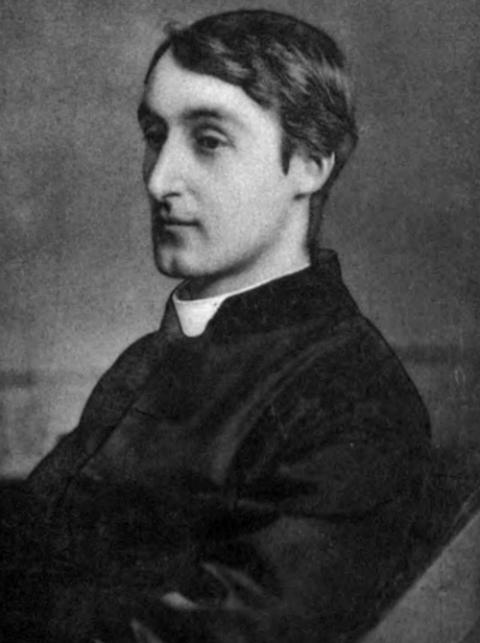
(Unsplash/Tim Foster)

Jesuit Fr. Gerard Manley Hopkins (Wikimedia Commons)
The best professor I ever had was Jesuit Fr. Ignatius Burrill who taught us English at Mundelein Seminary and introduced me to Jesuit Fr. Gerard Manley Hopkins.
To paraphrase Gale Sayers in his salute to Brian Piccolo at the end of "Brian's Song" — "I love Gerard Manley Hopkins and I'd like all of you to love him, too." Especially this Christmastime. But first, let me introduce you.
Hopkins, an English convert to Catholicism under the mentorship of John Henry (later Cardinal) Newman, was born in 1844 and died of typhoid at age 44 after a futile career as a priest and poet. Today, he is recognized as the greatest Catholic poet since Dante Alighieri, and to many is a saint.
I love Hopkins because his poems explode with beauty and joy. Like here, where he compares resurrection to a Heraclitan fire:
In a flash, at a trumpet crash,
I am all at once what Christ is, | since he was what I am, and
This Jack, joke, poor potsherd, | patch, matchwood, immortal diamond,
Is immortal diamond.
I love Hopkins because his poems help me to see everyone and everything with the eye of my soul, to behold the "dearest freshness deep down things," and feel the energy of love in a world "charged with the grandeur of God."
Nothing is so beautiful as Spring ...
What is all this juice and all this joy?
A strain of the earth's sweet being in the beginning
In Eden garden.
What I do is me: for that I came.
I say more: the just man justices;
Keeps grace: that keeps all his goings graces;
Acts in God's eye what in God's eye he is —
Christ — for Christ plays in ten thousand places,
Lovely in limbs, and lovely in eyes not his
To the Father through the features of men's faces.
But most of all I love Hopkins because he looked for God in all things, even when an inescapable melancholy tormented him like a hairshirt fixed to his skin. Like his contemporary, the poet Francis Thompson, who marveled "at all the sadness in the sweet, the sweetness in the sad." Indeed, what we label clinical depression now was called melancholia then, and Hopkins suffered from it for a good part of his life.
Advertisement
He captured the sadness of being in this world in his masterpiece "The Wreck of the Deutschland," which he wrote at age 22. It tells the story of five Franciscan nuns, fleeing religious persecution in their native Germany, on their way to America when their ship, the Deutschland, crashed against rocks. One of the nuns cried, "Christ, come quickly!" All of them drowned.
In language that is as unfathomable as the tragedy itself, Hopkins is really writing about the mystery of suffering and the mercy of God in the face of unstoppable death.
Thou mastering me
God! giver of breath and bread;
World's strand, sway of the sea;
Lord of living and dead;
Thou hast bound bones and veins in me, fastened me flesh,
And after it almost unmade, what with dread,
Thy doing: and dost thou touch me afresh?
Over again I feel thy finger and find thee.
The Jesuit magazine The Month rejected the poem. By 1930, Hopkins' poetry was recognized "as among the most original, powerful, and influential literary accomplishments of his century," in the words of Encyclopedia Brittanica.
And so it went. Hopkins continued to write poetry, but it was read only by friends and other poets. Like Robert Bridges, who would later become poet laureate of England. Bridges published an anthology of Hopkins' poems 29 years after his death. Today there are 22 separate editions of the poems of Hopkins, and more than 500 books about him.
Hopkins wrote many Easter poems during his life but just one Christmas poem that we know of. It is called "Moonless Darkness":
Moonless darkness stands between.
Past, the Past, no more be seen!
But the Bethlehem-star may lead me
To the sight of Him Who freed me
From the self that I have been.
Make me pure, Lord: Thou art holy;
Make me meek, Lord: Thou wert lowly;
Now beginning, and alway:
Now begin, on Christmas day.
And that is why I want you to love Gerard Manley Hopkins, especially this Christmastime. He was "a man of sorrows" (Isaiah 53:3) who looked for love in all the right places. He bowed to a God who went from "infinity to infancy" on Christmas Day, and prayed for a taste of eternity in God's creation. It's a sad, sweet world we live in, and only a poet in pain can show us the sweetness.
Hopkins, not unlike the suffering servant, was well acquainted with grief, and the world turned its back on him. A slight man, barely over 5 feet, "he had no stately form or majesty to attract us, no beauty that we should desire him," and yet his face reveals a tender gravity that draws in and embraces all the sufferings of the world with compassion and understanding.
And — beauty of beauties — in the midst of his misery, Hopkins continued to seek God in all things, and sing syllables of praise in what he saw. Even his poems of despair near the end of his life reveal a love and yearning for God, burning in his pain:
... birds build — but not I build; no, but strain,
Time's eunuch, and not breed one work that wakes.
Mine, O thou lord of life, send my roots rain.
Christmastime is a sad time for many of us, for many reasons, even without a pandemic. We are alone — again — or not alone and have another fight with our sister, or our expectations — again — don't come close to the real. This year, Christmas blues splash wider.
Hopkins says to us: don't give in to gloom, keep on looking for beauty, and "give beauty back, beauty, beauty, beauty, back to God, beauty's self and beauty's giver." I was once where you are, keep on, and the lord of life will send your roots rain. After all,
There lives the dearest freshness deep down things;
And though the last lights off the black West went
Oh, morning, at the brown brink eastward, springs —
Because the Holy Ghost over the bent
World broods with warm breast and with ah! bright wings.
And so it was. On his deathbed, Hopkins said, "I am so happy. I am so happy."






